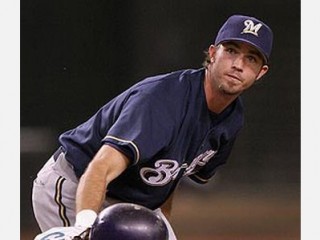
J. J. Hardy biography
Date of birth : 1982-08-19
Date of death : -
Birthplace : Tucson, Arizona
Nationality : American
Category : Sports
Last modified : 2024-08-19
Credited as : J.J. Hardy MLB career, Milwaukee Brewers draft, Baltimore Orioles shortstop, Gold Glove winner J.J. Hardy, Silver Slugger J.J. Hardy, All-Star Game 2007 J.J. Hardy, 2011 Baltimore Orioles resurgence
1 votes so far
J.J. Hardy: His Life and Career Journey in Major League Baseball
James Jerry Hardy (born August 19, 1982), known as J.J. Hardy, is a former professional baseball shortstop who enjoyed a successful career in Major League Baseball (MLB). Hardy played for the Milwaukee Brewers, Minnesota Twins, and Baltimore Orioles during his 13-year career, earning a reputation as a reliable and powerful presence both in the field and at bat. Hardy’s tenure in the MLB was marked by multiple accolades, including three Gold Glove Awards, a Silver Slugger Award, and an All-Star Game appearance.
Early Life and High School Success
Born in Tanque Verde, Arizona, Hardy attended Sabino High School, where he excelled as a multi-sport athlete. As the captain of the Sabercats baseball team, Hardy was recognized for his exceptional skills, earning All-State selections in 1999, 2000, and 2001, and an All-American selection in 2001. Additionally, Hardy was a member of the U.S. Junior National team that won the silver medal in Edmonton, Alberta, Canada, in 2001. His high school success set the stage for a promising professional career.
Professional Baseball Career
Milwaukee Brewers
Hardy was drafted by the Milwaukee Brewers in the second round of the 2001 MLB Draft. After steadily progressing through the minor leagues, he faced a setback in 2004 with a dislocated shoulder and torn labrum, forcing him to miss the entire season. However, Hardy made a strong comeback and secured the starting shortstop position in 2005. Despite a slow start, he finished his rookie season with a .247 batting average, 9 home runs, and 50 RBIs. Hardy continued to develop, culminating in a breakout 2007 season where he batted .277 with 26 home runs and 80 RBIs, earning a spot in the 2007 MLB All-Star Game.
In 2008, Hardy maintained his form, hitting .283 with 24 home runs and 74 RBIs. However, his performance dipped in 2009, leading to a brief demotion to Triple-A Nashville. He finished the season batting .229 before being traded to the Minnesota Twins.
Minnesota Twins
Hardy joined the Minnesota Twins in 2010 and played over 100 games, hitting .268 for the season. Though his time in Minnesota was brief, Hardy continued to demonstrate his solid defensive skills and consistent batting.
Baltimore Orioles
On December 9, 2010, Hardy was traded to the Baltimore Orioles where he experienced a career resurgence. In 2011, Hardy hit 30 home runs with 80 RBIs and signed a three-year extension with the Orioles. Over the next few years, Hardy’s defensive prowess earned him three consecutive Gold Glove Awards (2012-2014) and a Silver Slugger Award in 2013 as the best offensive player at his position. During his tenure with the Orioles, Hardy led all MLB shortstops in home runs from 2011 to 2013, hitting a total of 77.
Despite battling injuries in 2014, Hardy played a key role in the Orioles’ postseason efforts, including hitting his first career postseason home run in the 2014 American League Division Series (ALDS). He signed a three-year, $40 million extension with the Orioles that year, further solidifying his place in the team’s history.
In 2017, Hardy’s final season with the Orioles was marred by injuries, including a broken wrist that sidelined him for much of the year. He returned to the lineup in September but primarily served as a bench player. On September 24, 2017, Hardy received a warm send-off from Orioles fans during his final game at Camden Yards, marking the end of his impactful tenure with the team.
J. J. Hardy: Personal Life
J.J. Hardy comes from a family of athletes. His father was a professional tennis player, and his mother was a professional golfer. Hardy’s brother, Logan, served in the U.S. Army and was among the first to enter Baghdad during Operation Iraqi Freedom in 2003.
In his personal life, Hardy married Adrienne Acton, a former University of Arizona softball player, on December 7, 2013. The couple has two sons and resides in Chandler, Arizona. They also own a ranch in Montana, where they spend time away from the baseball field.
















